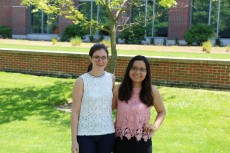A Richter you should know: Victoria Cisneros
 Assistant Professor of Spanish Denise Kripper (left) poses with Richter Scholar Victoria Cisneros ’20 (right), who is re...
Assistant Professor of Spanish Denise Kripper (left) poses with Richter Scholar Victoria Cisneros ’20 (right), who is re...
Whatever you do, don’t accuse Victoria Cisneros ’20 of using Google Translate. She’s spent weeks translating challenging material from Spanish to English with the help of Assistant Professor of Spanish Denise Kripper, and it is not as simple as copying and pasting.
This major in psychology and minor in Spanish is a Richter Scholar you should know.
Q: Tell us about your project.
A: I am learning about translating, particularly from Spanish to English, in order to help Professor Kripper prepare for a possible class in Spanish translation. I translated Professor Kripper’s dissertation introduction, which was 20 pages—that took about a week. Right now I’m translating the first chapter of her book manuscript, and the first chapter is 49 pages. Some things in Spanish you really can’t say in English because it sounds awkward, so you have to come up with a new way of saying it. As the translator, I am the one who gets to do this.
Q: What is the most interesting thing you’ve learned?
A: Only 3 percent of what is published yearly in the U.S. is in translation, but more that 40 percent of what gets published in Spanish-speaking countries comes from English-language translations. I’ve learned how translators are getting recognition for their work. Before the 1990s, they weren’t really appreciated and were considered lower than original writers because they were seen as just copying a work. In fact, translation was looked at as a “girl’s job.” Professor Kripper is looking at why translators are now becoming more appreciated in fiction.
Q: What is the most difficult part of your project?
A: Sometimes it’s a little bit difficult because I am Mexican American and Professor Kripper is Argentinian, so it’s a different type of Spanish from what I’m used to. I assume that some people think I’m just going on Google Translate and copying and pasting, but it’s much more difficult and time consuming. I was fluent in Spanish before this, but I’ve actually learned some new words because I hadn’t used some of the academic terms before. I’m reading “Nota al pie” by Rodolfo Walsh. It’s a short story about a translator who went crazy and committed suicide after having to translate so much.
Q: What is it like working with a professor?
A: Professor Kripper actually wants my input. I’m pretty shy and kind of awkward at first meeting someone, so it was extra awkward to be talking with her as a professor. But eventually I figured out that I could just talk to her as a regular person.
Q: How will this research help you in the future?
A: This research has encouraged me. I want to be a therapist, and am pursuing a Spanish minor so that I can get better at my Spanish, which will help me help my Spanish-speaking clients. Sometimes the Latino community is discouraged from going to therapy because there aren’t that many Spanish speakers in therapy. I want to interpret, which is spoken translation, but I also want to translate. It would be cool translating medical documents. This project has helped me see the possibilities.
– By Tracy Koenn ’18 and Sophie Mucciaccio ’18